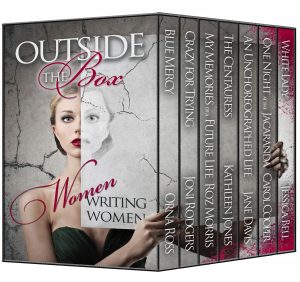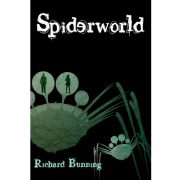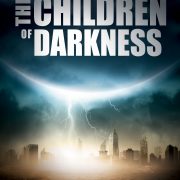Today’s featured guests, seven prominent indie writers, are here to discuss what ought to change in mainstream publishing. Their limited edition box set—Outside the Box: Women Writing Women—will be available in e-book format beginning February 20 for just 90 days. The set may be pre-ordered now.
The project is the brainchild of Jessica Bell, an Australian writer living in Athens, Greece. A literary author and the Founder/Publishing Editor of Vine Leaves literary journal, Jessica wanted to showcase the most exciting fiction being released by authors who are in full charge of their own creative decisions. “I couldn’t imagine collaborating with a finer group of writers,” Jessica said. “The authors in this box set are at the very top of their game.”

The compilation of novels introduces a diverse cast of characters: A woman accused of killing her tyrannical father who is determined to reveal the truth. A bookish and freshly orphaned young woman seeks to escape the shadow of her infamous mother—a radical lesbian poet—by fleeing her hometown. A bereaved biographer who travels to war-ravaged Croatia to research the life of a celebrity artist. A gifted musician who is forced by injury to stop playing the piano and fears her life may be over. An undercover journalist after a by-line, not a boyfriend, who unexpectedly has to choose between her comfortable life and a bumpy road that could lead to happiness. A former ballerina who turns to prostitution to support her daughter, and the wife of a drug lord who attempts to relinquish her lust for sharp objects and blood to raise a respectable son.
Jane Davis said, “This set of thought-provoking novels showcases genre-busting fiction across the full spectrum from light (although never frothy) to darker, more haunting reads that delve into deeper psychological territory.”
But regardless of setting, regardless of whether the women are mothers, daughters, friends or lovers, the themes are universal: euthanasia, prostitution, gender anomalies, regression therapy, obesity, drug abuse, revenge, betrayal, sex, lust, suicide and murder. Their authors have not shied away from the big issues. Some have asked big questions.

Orna Ross (founder-director of The Alliance of Independent Authors, named by The Bookseller as one of the 100 most influential people in publishing) selected Blue Mercy, a complex tale of betrayal, revenge, suspense, murder mystery – and surprise.
Joni Rodgers (NYT bestselling author) returned to her debut Crazy for Trying, a Barnes & Noble Discover Great New Writers selection and a Discover Award finalist.
Roz Morris (ghost writer and teacher of creative writing master classes for the Guardian newspaper in London) presented My Memories of a Future Life, the haunting story of how one lost soul searches for where she now belongs.
Kathleen Jones, best-selling award winning author, Royal Literary Fund Fellow, whose work has been broadcast by the BBC, contributed The Centauress, a compelling tale of family conflict over a disputed inheritance.
Jane Davis (a British writer whose debut won the Daily Mail First Novel Award) nominated An Unchoreographed Life, an unflinching and painfully honest portrayal of flawed humanity.
Carol Cooper (author, doctor, British journalist and president of the Guild of Health Writers) provided One Night at the Jacaranda, a gripping story about a group of people searching for love, sex and everything in between.
For Jessica Bell (Australian novelist, singer/songwriter, Publishing Editor of Vine Leaves Literary Journal and whose award-winning poetry has been broadcast on ABC National Radio), her latest novel White Lady was the obvious choice, an intense, suspenseful ride rife with mystery.
Each of the authors addresses this question:
If you were Queen of Publishing for a day, what’s one thing you’d change about the industry as a whole?
Orna: The reason I love self-publishing so much is that it’s democratising and it encourages diversity. Readers and writers together are now creating new genres and books that London and Manhattan would never have published. If I were Queen of Publishing for a day, I’d make it much more diverse. I’d love to see a greater variety of voices at every level of the industry.
Jessica: That’s a tough one. Can it stop being such a popularity contest and get back to its roots? Focus on the writing, not how many followers the author has on Twitter? In an ideal world…
Roz: I would ask for more literary awards to open up to new writers. Not just to indies, but to all the new talent that comes along. Too many literary awards are given on the basis of pre-existing fame. If those authors genuinely wrote the best book of the year, then they deserve the prize, but otherwise we should give awards to the genuinely surprising, interesting and wonderful – not the usual suspects. Sometimes the best book has been written by Hilary Mantel, Julian Barnes or Neil Gaiman – but sometimes it’s been written by someone relatively unknown. And those are the books that awards should be finding for us.
Carol: Although it should be obvious that there’s more than one way to publish quality books, some people in both camps sadly take up entrenched positions. Those in traditional publishing especially tend to snipe at the other side, and the antagonism does nobody any favours. We shouldn’t be at war, because in the end it’s all about the reader. I’d like to bring in a lot more enlightenment and a bit more peace, but I may need more than a day to achieve it.
Kathleen: I’d ban accountants from the commissioning meeting! Books should be accepted on literary value alone; it’s the only way to get a quality product. Readers quickly tire of being sold ‘the next best thing’. They want variety, good stories, original, surprising prose – they deserve the best, not some publicist’s idea of what they can be conned into thinking is the best. Not only that, but many of the books they buy purporting to be written by celebrities are in fact written by someone else – usually a professional writer whose own work has been rejected but who needs the money. To pass off a book in that way is fraudulent – at best a con trick. We need to take the fake out of the fiction industry and writers need to be free to write the books they want to write and readers want to read.
Jane: The options for those wishing to publish are now wider than ever before, so I don’t think it’s the publishing industry I would change. It is the perception of publishing and the value that we place on books and art that I’d like to target. This year, I’ve been out speaking to librarians and booksellers trying to encourage them to stock – and read – more indie titles. If Andrew Lownie’s prediction is right, over 75% of books will be self-published by the year 2020. Any outlet that refuses to stock indie titles will be doing readers an enormous disservice by restricting choice. The other thing I’d like to be able to do is to get out there and sell my books for the listed price. I hear parents talk about spending £120 on trainers for their children – something that will be outgrown in 6 months. People will fork out over £50 to see a band play, they’ll happily pay £2.45 for a coffee or £3.60 for a pint of beer, and yet they throw up their hands in horror at the idea of paying £8.99 for a paperback. Is the real issue that readers’ needs are not being catered for? £8.99 may seem a lot of money for something you don’t enjoy. I found the results that Kobo have collated about books readers give up on half way through very telling, with The Goldfinch and Twelve Years a Slave topping the list (the books readers were told they should be reading), whilst the book they were most likely to finish? Casey Kelleher’s self-published thriller Rotten to the Core.
Joni: Oh, Lord, I’d tell everyone to take the day off and read a book. That’s the single most important thing writers can do—for ourselves and for the book culture at large—but we leave ourselves so little time for it.





 The urge to write first struck when working on a newsletter at a youth encampment in the woods of northern Maine. It may have been the night when lightning flashed at sunset followed by northern lights rippling after dark. Or maybe it was the newsletter’s editor, a girl with eyes the color of the ocean. But he was inspired to write about the blurry line between reality and the fantastic.
The urge to write first struck when working on a newsletter at a youth encampment in the woods of northern Maine. It may have been the night when lightning flashed at sunset followed by northern lights rippling after dark. Or maybe it was the newsletter’s editor, a girl with eyes the color of the ocean. But he was inspired to write about the blurry line between reality and the fantastic.







